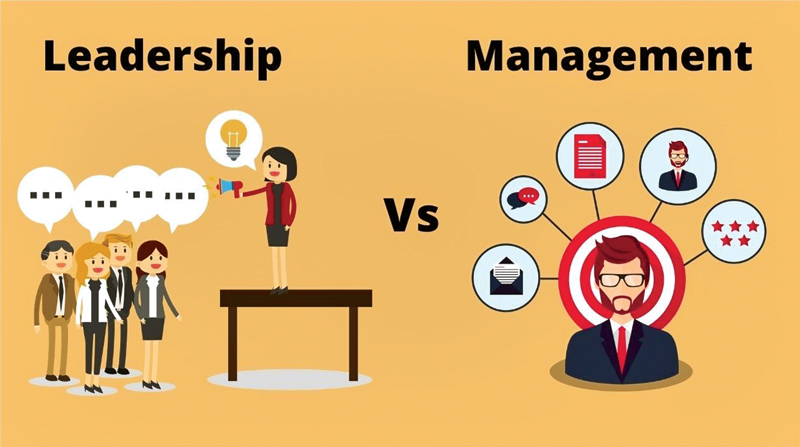 While leadership is an influence process to inspire, motivate, and enable others to contribute to an organisation’s success, management is the process responsible for controlling the practical operation of an organisation to achieve a common purpose.
While leadership is an influence process to inspire, motivate, and enable others to contribute to an organisation’s success, management is the process responsible for controlling the practical operation of an organisation to achieve a common purpose.
In business success, both components are equally valuable and perhaps the most critical aspects. The real application of the two elements is different from each other but hugely interconnected and plays decisive roles in business success, and striking the right balance between leadership and management is crucial.
At the outset, it is essential to understand the distinct difference between the two facets. Leadership is all about motivating and persuading others to work towards a common goal or vision. It emphasises long-term strategic thinking, establishing a course of action, and encouraging and enabling workers to take that course of action. Effective leaders develop a sense of purpose and nurture a culture of continual improvement.
Most often, leaders are visionaries, capable of seeing the larger picture of both business success and the career development of subordinate staff. They possess emotional intelligence, have the capability of inspiring others, and have the ability to connect effectively and easily with subordinates. Good leaders prioritise people and connections in order to foster a mutual sense of belonging.
Management, on the other hand, involves the day-to-day operations of an organisation. Managers are responsible for planning, organising, and controlling resources to achieve specific, short-term goals. They focus on efficiency, productivity, performance, and timely completion within budgets.
They are process-oriented and often attempt to maintain order with their staff members by adhering to processes, procedures, systems, and well-defined workflows. A good manager skillfully organises things within a frame, makes timely decisions, and delegate tasks.
Leadership is a concept. It is not a position, person, or place. The leader and the leadership are two different aspects. Leaders are the actual individuals who make decisions, take risks on the decisions made, and take responsibility for the consequences, regardless of the outcome.
Leadership in an organisation is a formidable factor that helps create the most effective groundwork for success. Successful business leaders possess five sources of leadership power. They are empowered legally by the organisation that provides them with legitimate cover that extends power to reward subordinates and also penalise them when necessary.
Leaders are also experts in their line of work. This knowledge can provide proper guidance to staff members on how to perform their duties. Finally, good leaders have referent power, meaning that they are good coaches, and the followers unconditionally trust them in matters pertaining to official or personal issues.
Conflicts
No matter how competent the managers are, unhealthy leadership can slow down processes if their vision is limited in relation to generating value at work. Instead of motivating workers based on broader desires, if a manager is narrow in purpose and their imaginative capacity is inadequate, workplace conflicts can surface. Hence, competent managers with leadership attributes are nd for a successful result.
The leadership vision is perhaps among the hardest fundamental competencies a leader should possess. Executing a leadership vision is not only the ultimate goal of an organisation but also a key factor in its success. However, to achieve the vision, the leader must be able to define the vision, strategy, and tactical plans and communicate them to the others in the organisation.
They should establish the direction in which the company should move and help align the entire team towards a common purpose. In the absence of a leadership vision, a business may lack focus and a sense of purpose.
A leader also must possess skills in innovation and adaptation; they should foster innovation and encourage employees to think creatively. They are open to change and can adapt to evolving market conditions, helping the business stay competitive. A strong leader can drive innovation, which is essential for long-term growth and sustainability.
The ability to inspire and motivate employees is an extremely important trait for a manager. A motivated workforce is more productive, creative, and committed to the company’s goals. Engaged employees are also more likely to stay with the organisation, reducing turnover and associated costs.
Nevertheless, it is not easy to get people moving forward, as a workforce can have different levels and factors of self-motivation. A leader must be able to keep the team motivated in good times and bad times equally well. Hence, good leaders consciously engage in motivating their teams, not by chance. They are purposeful in taking action to keep the workforce happy and motivated.
Great leaders don’t leave motivation to chance. They know that the slightest mishap, whether internal or external, can bring the feeling of coexistence to a halt. Great leaders are purposeful in making sure their actions always push the team ahead with positivity and productivity.
Leaders shape the company’s culture by setting the tone through their actions and behaviours. A study conducted by Workhuman (formerly Globoforce), an Irish multinational company providing human capital management software solutions, revealed that happy employees are 85 percent more efficient, experience a 60 percent drop in absenteeism, and have a substantial impact on performance. A positive organisational culture can lead to higher employee morale, improved teamwork, and better customer relationships. While the leadership qualities of a manager are crucial, there is no doubt that effective management is equally essential for business success. Managers ensure that the institution’s day-to-day operations run smoothly and efficiently. They translate the strategic vision of the leader into actionable plans and ensure that tasks are completed on time. This execution is vital for achieving the business’ short-term goals and objectives.
They are responsible for efficient allocation of resources to optimise performance. The efficient use of funds available, the assignment of tasks to each employee, setting up time targets, and the allocation of personnel to obtain optimal performance are the concerns of a manager.
Accountability enhanced through performance evaluation of individual workers is an important element in organisational success. This plays a significant role in building a culture of accountability.
Accountability
A workplace where everyone takes ownership of their actions, meets deadlines consistently, and hold themselves accountable for delivering quality work inevitably leads to accountability. It also fosters trust, encourages innovation, and cultivates a strong sense of solidarity among team members.
Therefore, good managers understand that formal assessments provide an opportunity to evaluate individual performance against established goals or benchmarks. They establish clear goals and obtain constant feedback to assess employee performance. This accountability ensures that employees are held responsible for their roles and contributes to maintaining high standards within the organisation.
It is vitally important that managers perfectly understand the distinction between leadership traits and management skills and find the right balance when applying the two criteria at the workplace. In application, either one is not more important than the other. In the absence of one, the other might fail. Simply put, good leadership complements skilled management practices in any business environment.
Both leadership and management are indispensable for a successful organisation. In theory, they play different roles with unique characteristics. While the leadership traits of a person set the vision and inspire the team, the management skills of the same person execute the plan and ensure that day-to-day operations align with the common goals of the organisation. When these two principles are unified, businesses can achieve efficiency and growth.







